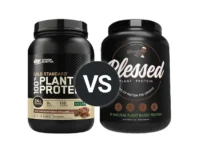Knowledge BaseYou're Questions Answered
Is whey protein powder gluten free?
Whey protein powder is a popular dietary supplement derived from the liquid portion of milk that separates during cheese production. It is well-known for its high protein content and rapid absorption rate, making it a favored choice among athletes and fitness enthusiasts. For individuals with celiac disease or gluten sensitivity, it's important to know whether whey protein powder contains gluten, a protein found in wheat, barley, and rye.
Gluten-Free Status of Whey Protein Powder
Whey protein powder is naturally gluten-free. The process of deriving whey protein from milk does not involve any gluten-containing grains, and thus pure whey protein powder should not contain gluten1. There are different forms of whey protein, such as whey protein concentrate, isolate, and hydrolysate, and all these forms are inherently gluten-free as they are derived from milk proteins.
Considerations for Gluten-Free Safety
While whey protein itself is gluten-free, certain factors need to be considered to ensure the product is safe for those avoiding gluten:
- Cross-Contamination: Cross-contamination can occur if whey protein powder is processed or packaged in facilities that also handle gluten-containing ingredients. Even trace amounts of gluten can be harmful to individuals with celiac disease. To minimize this risk, it is advisable to choose whey protein powders that are certified gluten-free, indicating they have been tested and verified to contain less than the allowable limit of gluten (usually less than 20 parts per million) according to gluten-free labeling standards2.
- Added Ingredients: Some whey protein powders include additional ingredients such as flavorings, thickeners, or other additives that could potentially contain gluten. Always check the ingredient list and look for clear gluten-free labeling or certification to ensure the product does not contain gluten.
Benefits of Choosing Gluten-Free Whey Protein Powder
For individuals who are gluten-sensitive or have celiac disease, selecting gluten-free whey protein powder offers several benefits:
- Safe Protein Source: Provides a high-quality protein source without the risk of gluten contamination, helping to avoid adverse reactions.
- Variety of Options: Gluten-free whey protein powders are available in various forms, including concentrate, isolate, and hydrolysate, allowing for choices based on dietary preferences and protein needs.
- Enhanced Product Safety: Certified gluten-free products undergo testing to ensure they meet strict gluten-free standards, providing an added layer of safety and assurance for consumers.
- Smithers, G. W. (2008). Whey and whey proteins—from ‘gutter-to-gold’. International Dairy Journal, 18(7), 695-704.
- Thompson, T. (2009). The gluten-free labeling of foods: What should be the regulatory standard? American Journal of Clinical Nutrition, 90(3), 561-568.
Related Questions
Related Reviews

Your Answer
We are a participant in the Amazon Services LLC Associates Program, an affiliate advertising program designed to provide a means for us to earn fees by linking to Amazon.com and affiliated sites.




